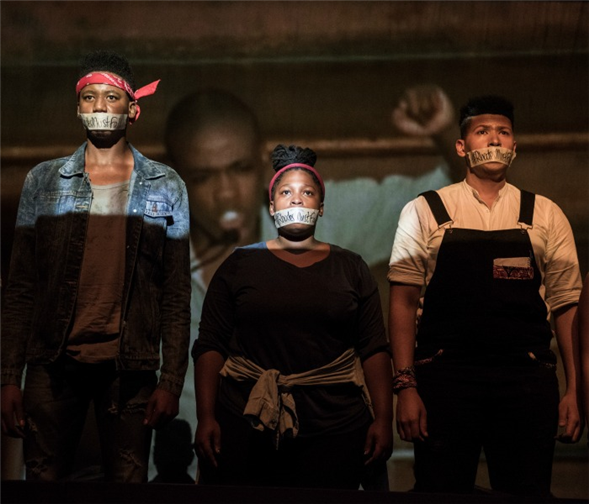Translate Page

There's much to be learned from the South African protest docudrama The Fall
---
"Nothing about us without us!" That slogan served as a rallying cry for the University of Cape Town (UCT) students who, in the spring of 2015, demanded a statue of 19th-century British imperialist Cecil Rhodes be removed from campus. Their story is recounted in The Fall, a devised theatre piece imported to Brooklyn's St. Ann's Warehouse from South Africa's Baxter Theatre Centre. Considering we are currently in the midst of tearing down Confederate monuments across the U.S., this docudrama seems incredibly timely. However, its examination of how internal divisions can hamper political progress may be the show's most valuable lesson.
Rhodes was a diamond czar, politician, and unabashed white supremacist whose likeness was placed on a pedestal amid the continent's largest university. Yes, a portion of his estate paid for the land on which the institution stands (as well as the internationally renowned Rhodes Scholarship program). However, his statue was a reminder that UCT was established primarily to serve white students, and did so up until the abolition of apartheid in 1994.
Protests assailing Rhodes' continuing presence on campus date back decades, and university officials agreed to remove the statue -- eventually. Three years ago, when the school's vice-chancellor made yet another empty promise, refusing to set a firm date, fed-up student demonstrators decided to occupy the administration building.
The protesters' actions ultimately proved successful, but not without engendering the predictable turmoil of political infighting. The Fall also tells that less headline-grabbing. It's a vivid trajectory, captured in veristic detail by seven actors, the majority of whom were involved in UCT's decolonization movement. According to Ameera Conrad -- who plays a Muslim lesbian described in the script as "the one who searches" -- each character is about 60 percent autobiographical, with the remaining 40 percent a composite of "as wide a range of people as possible," including those with opposing views. "We felt that a play about seven drama students would be really boring," she observes dryly.
The performer/playwrights crafted the script through extended improvs, including poetry and movement. Both survive in the irresistible threads of song and dance that stitch the scenes together. Conrad and fellow "curator" Thando Mangcu would transcribe the group sessions, and then the troupe honed the script collaboratively until everyone approved the final version.
"We had many, many discussions and debates and arguments about what it was that had to go in, at any given time," Conrad recalls. "But in the end" -- a mere three weeks! -- "we got a script everyone is very happy with."
{Image1}
Even so, the co-creators continue to tinker. The play opened in 2016 at the Baxter Theatre Centre, a UCT-supported incubator for protest theatre over the past four decades. "Athol Fugard, John Kani, Winston Ntshona -- these are the giants upon whose shoulders we're standing," Conrad notes. The Fall went on to earn rave reviews at the 2017 Edinburgh Festival Fringe, which led to runs at London's Royal Court Theatre and now New York City.
"It's obviously a very South African play," admits Conrad. "But it's also a very global play. Whenever we go anywhere new, we really want the people there to fully understand what the show is trying to say. So if there are very, very deeply South African colloquialisms, we try to sort of translate the slang."
Once the exploiter was finally toppled (#RhodesMustFall), the students were galvanized to take on other causes, including gender inequality (#PatriarchyMustFall) and the burden of rising student debt (#FeesMustFall). But as the play skillfully documents, being on the same page politically doesn't always smooth away personal friction: issues of class, colorism, gender, and sexual identity crop up throughout the script.
Sound familiar? Asked whether she has any suggestions for young U.S. activists, who are fighting similar external and internal battles, Conrad doesn't mince words. "Don't be afraid to tell your story. If you don't, it can be co-opted."
---
Sandy MacDonald is a theatre critic who contributes to Time Out New York. Follow her at @sandymacdonald. Follow TDF at @TDFNYC.
Top image: Sizwesandile Mnisi, Tankiso Mamabolo, and Cleo Raatus in The Fall. Photos by Teddy Wolff.
TDF MEMBERS: Go here to browse our latest discounts for dance, theatre, and concerts.